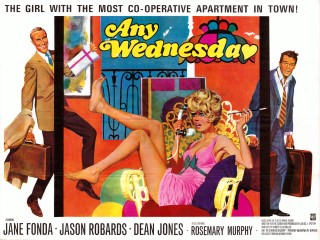
ANY WEDNESDAY
US, 1966, 109 minutes, Colour.
Jane Fonda, Jason Robards, Dean Jones, Rosemary Murphy.
Directed by Robert Ellis Miller.
Any Wednesday is a screen adaptation of a play by Muriel Resnik and Julius J. Epstein (the writer of many films including Casablanca). This is a frothy sex comedy with a touch of French farce from the 1960s.
It was directed by Robert Ellis Miller, director of a number of films like this at the time but his stand-out film was the Alan Arkin vehicle, Carson McCullough’s? The Heart is a Lonely Hunter.
Jane Fonda had been appearing in films for about five years by this time after beginning with Tall Story and Period of Adjustment. She had married Roger Vadim and was about to appear in The Game is Over and Barbarella. However, this is more in the vein of Barefoot in the Park which also appeared at this time.
She plays Ellen, a young woman looking for an apartment. A married businessman decides to set her up and she is found by one of his associates, Dean Jones, and looked after by his wife, Rosemary Murphy.
The strength of the film is in some snappy dialogue. But it relies very much on the tradition of mistaken identities, compromising situations, people rushing in and out of rooms – the ingredients of popular French farce.
1. The appeal of the flip comedy, sex comedy, farce? A Jane Fonda vehicle?
2. The tone of the title, the light touch, the sex farce American style, its particular characteristics, its presentation of American values, double values, good and right?
3. The importance of colour, New York atmosphere, art galleries and paintings, the seasons? The world of apartments, business, restaurants? The musical score, the theme song? The split screen techniques - for humour, dramatic irony? A world of wealth? How particularly American?
4. Was it evident the film was based on a play: the set-up the dialogue. the staging of the action? Did this matter?
5. The tone of the credits, the party, the paintings, the phone call and Ellen’s sudden involvement, the revelation of John Cleves, the outing and the pursuit of Ellen? The humour of the passing of time with the paintings and the telephone calls?
6. The immediate impact of John Cleves? Jason Robards’ style for comedy, a deceptive character? What kind of a person was he in himself, his business, aplomb, his lies to his wife, his pursuit of Ellen, his theory of Wednesdays, his trying to trick Ellen at their first meeting? The motives for his pursuit of her over a long time? The hospital visit, the Time Magazine article? The flowers, the balloons, setting up the executive suite? His love for Ellen and the passing of the years? The significance of the Wednesdays? His attitude towards Dorothy, towards his children - the later irony of meeting Dorothy and the truth about the children? The business American? Type, middle age, romance, lies? Selfish?
7. The contrast with Jane Fonda as Ellen? Fresh, resisting pursuit, turning John Cleves out? Her hepatitis, succumbing to his charm? The impact of the executive suite? The passing of the years? Her love for him? The importance of her birthday and her tears, the present? The fact that she was a child? A credible type? The depth of the characterization, the farcical elements in the characterization?
8. The importance of the brevity of the years passing and the concentration on the final days?
9. The importance of the events on Ellen’s birthday? Giving the lead to the aftermath and for the structure of the final part of the film?
10. The birthday morning, the jewels? The humour of Miss Lynley sending so many people to the executive suite? Cleves's angry phone calls?
11. The introduction to Cass Henderson as a type, man, inventor, exploiting the situation? His attraction to Ellen? His saving face with Dorothy and with Cleves? His plan, the rebuff by Cleves and yet the utility of the lock? His reaction to Ellen and rushing to the river after her? The farcical and compromising situations? Dorothy’s interpretation? Going to dinner etc.? A credible preparation for his eventually marrying Ellen?
12. Rosemary Murphy’s style of characterizing Dorothy: her style, wealth, snobbishness, broadmindedness? Her trying to solve Henderson's marriage problems? Felix and the rearrangement of the room? Dinner? Her relationship with her husband, the irony of their relationship at the end? A credible type after this experience of marriage?
13. The importance of Cleves and his inability to cope at the apartment, at the dinner, his domination of the car game? His decision to divorce Dorothy, marry Ellen, his inability to be faithful to Ellen and the irony of his being left high and dry?
14. The dramatic and humorous significance of the games in the car?
15. The irony of the final pairing-off and the elements of truth and deception?
16. Themes of love, sexuality, wealth, power, truth?
17. How well were the themes explored in terms of a light comedy? In terms of good and evil, right and wrong?